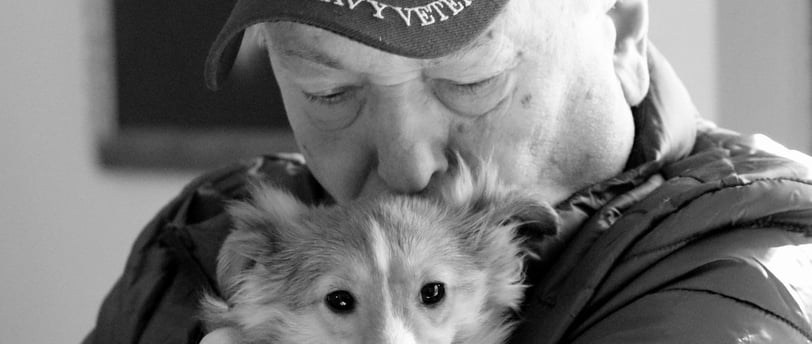Veterans and Service Dogs: A Helpful Guide
Explore the vital relationship between veterans and their service dogs. Learn how to get a service dog and discover the numerous benefits these loyal companions offer to veterans. Find resources and guidance for navigating the process.
LITTLE LESSONS
1/3/20254 min read


Service Dogs and Veterans
Service dogs have long been recognized for their ability to transform lives, offering independence, assistance, and unwavering companionship to individuals with disabilities. But disabilities aren’t just physical—many are mental, and the invisible scars left by trauma can be just as challenging to navigate. For veterans, these challenges can be profound. Service dogs bridge the gap, offering support that addresses both physical and mental needs in ways that are as unique as the individuals they serve. Veterans and service dogs are, quite simply, a perfect pair.
History of Service Dogs for Veterans
The partnership between veterans and service dogs began gaining recognition after World War II when guide dogs were first introduced to assist soldiers who lost their sight in combat. Over the decades, the role of service dogs expanded, addressing not just physical impairments but also mental health conditions such as PTSD. Programs like those initiated after the Vietnam War laid the groundwork for today’s robust service dog initiatives. These programs have since evolved, with nonprofit organizations and government support increasing access to service dogs for veterans in need.
The Growing Need for Service Dogs
Returning to civilian life can be a daunting journey for many veterans. Physical injuries, PTSD, anxiety, depression, and other challenges can make reintegration difficult. Veterans often struggle with hypervigilance, social isolation, and a loss of independence.
Service dogs step in to help bridge these gaps. They are trained to perform tasks such as interrupting anxiety attacks, providing grounding during flashbacks, and assisting with mobility. Research shows that service dogs can significantly reduce symptoms of PTSD, improve overall mental health, and enhance the quality of life for veterans. The demand for service dogs continues to grow as their profound impact becomes more widely understood.
Visit Mission Roll Call for a more in-depth exploration of this topic.
The Benefits of Service Dogs for Veterans
Emotional Support: Service dogs offer a calming presence, helping veterans manage anxiety, depression, and PTSD. They provide a sense of stability and companionship that can be life changing.
Physical Assistance: For veterans with mobility impairments, service dogs perform essential tasks such as retrieving items, opening doors, and providing balance support.
Increased Independence: With a service dog by their side, veterans often regain the confidence to navigate daily life without constant reliance on others.
Socialization and Safety: Service dogs help veterans feel safer in public spaces, reducing hypervigilance and encouraging social interactions that might otherwise feel overwhelming.
The Bond Between Veterans and Service Dogs
The connection between a veteran and their service dog goes beyond practical assistance. It’s a bond built on trust, loyalty, and mutual respect. Many veterans describe their service dogs as their lifeline—a source of comfort and motivation in their darkest moments.
A service dog can learn to interrupt them during a flashback or help give their handler space in crowded environments. Situations like these show the unique and powerful relationship that can form between veterans and their service dogs, offering both hope and healing.
Training Service Dogs for Veterans
Service dogs undergo rigorous training to meet the unique needs of any handler, especially veterans, addressing both physical and mental challenges. This includes tasks like:
Interrupting nightmares
Guiding through crowded spaces
Providing stability for mobility challenges
Alerting to anxiety or panic attacks
Training is tailored to the individual veteran, recognizing that while the challenges may have similar names, their symptoms and triggers are deeply personal. Organizations specializing in veteran-focused training ensure that each dog is equipped to support their handler’s unique needs.
How Veterans Can Get a Service Dog
Veterans interested in obtaining a service dog can start by reaching out to organizations that specialize in pairing service dogs with veterans. Some nonprofits offer these services at little to no cost, thanks to donations and sponsorships. The VA offers ways to get funding to help cover the costs of a service dog.
Additionally, there a variety of websites can help veterans explore their options. Check out our post on how to determine if a service dog is right for you, and how to find the perfect match.
The support for these pairings continues to grow, with more programs and resources becoming available every year. Veterans are encouraged to explore these opportunities and find the right partner to help them on their journey.
Challenges and Considerations
While the benefits of having a service dog are immense, it’s important to consider the responsibilities involved. Veterans need to be prepared for the commitment of caring for a service dog, including daily training, exercise, and healthcare.
Veteran-specific challenges might include navigating public spaces with a service dog or adapting to the initial transition period of working with a new partner. It's very important to consider a number of factors- our post takes you through the most common factors.
For those preparing to welcome a service dog into their lives, planning and education are key.
Conclusion
The partnership between veterans and service dogs is one of mutual benefit and profound impact. These dogs provide not only practical assistance but also emotional healing, offering veterans a path to greater independence and improved well-being.
If you’re a veteran or know someone who could benefit from a service dog, consider reaching out to the many organizations dedicated to fostering these life-changing partnerships. Together, we can continue to support and grow this incredible bond, ensuring that every veteran who needs a service dog can find their perfect partner.
photo credit: dave thomas on pexels
